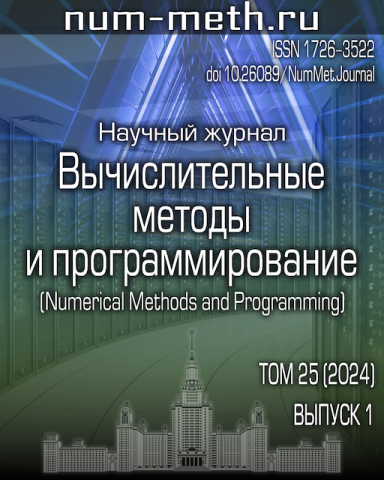- 06 мая 2021
06.05.2021 (четверг) в 17.15 состоится 147-ое, заседание семинара "Математическое моделирование геофизических процессов: прямые и обратные задачи"
Заседание семинара пройдет в форме вебинара на платформе Zoom.Программа семинара:
Overcast on TRAPPIST-1e: simulations of convection on rocky exoplanets.Denis E. Sergeev (1), F. Hugo Lambert (1), Nathan J. Mayne (2), Ian A. Boutle (2,3), James Manners (3,4)
(1) Department of Mathematics, College of Engineering, Mathematics, and Physical Sciences, University of Exeter, UK
(2) Department of Astrophysics, College of Engineering, Mathematics, and Physical Sciences, University of Exeter, UK
(3) Met Office, Fitzroy Road, UK
(4) Global Systems Institute, University of Exeter, UKАннотация к докладу:
We now know that exoplanets - planets orbiting stars other than the Sun - are ubiquitous and diverse. Atmospheres of these distant worlds present an opportunity to answer fundamental questions about their evolution and dynamics, and even their potential for harbouring life. Detecting an exoplanet with a habitable atmosphere is becoming more and more likely with the imminent launch of more powerful telescopes, such as the James Webb Space Telescope (2021) and the Extremely Large Telescope (2025); joined by the end of the decade by the Habitable Exoplanet Observatory or the Large UV/Optical/IR Surveyor. In order to make the best use of future observational data, it is imperative to improve our theoretical understanding of extraterrestrial atmospheres and consider all possible physical and chemical processes. It is particularly important to study terrestrial exoplanets orbiting M-dwarfs, because M-dwarf stars are the most numerous stars in our galaxy and offer a higher chance for temperate planets to be detected around them. Such exoplanets are expected to be tidally locked to their host stars and thus create a climate that is likely completely different to that of Earth.Convection is an important driver of energy redistribution in planetary atmospheres. By forming clouds and interacting with small-scale turbulence, convection is a key part of complex feedback mechanisms in the climate system. In my work, I focus on the climate of tidally locked rocky exoplanets and its sensitivity to the representation of moist convection in a climate model. I use a versatile 3D general circulation model, the UK Met Office Unified Model, to simulate hypothetical climates of two confirmed terrestrial exoplanets (e.g. TRAPPIST-1e) and show that convection can affect the climate of the day side, and even more so, the night side. I then advance my analysis by doing high-resolution experiments with explicit convection, and find that global models have biases in cloud structure and their radiative effects. The explicit convection experiments also indicate that global models may overestimate the heat redistribution between the day side and the night side of the planet.
In my talk, I will introduce the audience to the young and exciting field of exoplanets and talk about research carried out in the Exeter Exoplanet Theory Group, before showing some recent results from a model intercomparison for TRAPPIST-1e and presenting my high-resolution simulations of convection.
Join Zoom Meeting
https://us02web.zoom.us/j/87697531493?pwd=Z2N2QkorU1hRSUQ4YzF3VEZicHVTZz09Meeting ID: 876 9753 1493
Passcode: 925431Инструкции по установке и использованию платформы Zoom доступны, например, здесь: https://support.zoom.us/hc/ru/articles/201362033-Начало-работы-на-ПК-и-Mac. Для связи по всем вопросам, касающимся работы семинара, обращайтесь к ученому секретарю Андрею Дебольскому по адресу and.debol@srcc.msu.ru
Семинар "Математическое моделирование геофизических процессов: прямые и обратные задачи"
Новости
Семинар «Спектральная теория дифференциальных операторов», 29 октября 2025 г.27 октября 2025 16:54В серии «Суперкомпьютерное образование» вышел учебник Н.В. Лукашевич и А.А. Сорокина20 октября 2025 00:16Журнал НИВЦ
Контакты
119234, Российская Федерация, Москва, ГСП-1, Ленинские горы, дом 1, стр. 4, НИВЦ МГУ
+7 495 939-5424,
Подробнее
ОБЛАКО ТЕГОВ
3D изображения 270-летие Московского университета 300 лет РАН Земная система Ломоносовские чтения Минобрнауки Научная Россия Научно-методологический семинар НИВЦ МГУ РНФ Российский научный фонд Семинар Фонд автоматическое реферирование анализ информационных ресурсов аспиранты и студенты благодарность влияние климата вычислительно-информационные технологии вычислительные методы геофизические процессы государственная награда грант защита диссертации интервью информационные системы информационные технологии климатическая система компьютерная лингвистика конгресс конкурс конкурс РНФ конкурс статей конкурсы президенские конференция лекция марафон математическое моделирование международная конференция методы машинного обучения моделирование Земной системы молекулярное моделирование молекулярный докинг молодежный конкурс молодые сотрудники молодые ученые награждение наука наука и образование научный журнал научный конкурс образование параллельные вычисления персонализированная медицина почетная грамота премия премия Ломоносова производство лекарств промышленность публикация стипендия супекомпютер суперкомпьютер суперкомпьютерное моделирование суперкомпьютерные дни суперкомпьютерные технологии суперкомпьютерный комплекс суперкомпьютерный центр МГУ ученый совет цифровизация школа школа-семинар экология экспериментальная лингвистика эстафета
Все материалы сайта НИВЦ МГУ доступны по лицензии:








